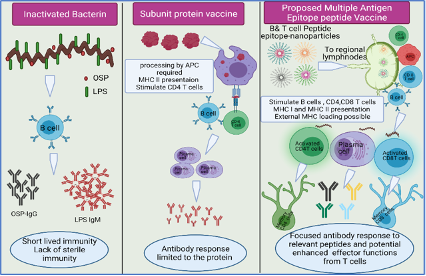Antigen Discovery Useful for Vaccination and Diagnostics in Canine Leptospirosis
The Problem
Leptospirosis is bacterial zoonotic disease that affects both humans and animals. Canine leptospirosis can be a serious and life-threatening disease. Additionally, the infection rate for leptospirosis in dogs has been on the rise. Vaccines currently in use may only provide protection for up to 12 months. Diagnostic tests, such as MAT and DNA-PCR, are not efficient and may provide false negatives.
The Solution
Utilizing a high throughput microarray, researchers at the University of Tennessee have identified multiple epitopes that are useful for vaccine and diagnostics development against Leptospirosis in dogs. This technology could lead to a cross protective vaccine that would potentially provide longer lasting immunity as compared to current vaccines on the market.

Figure 1 - Difference in immune response generated in the current vaccines and the proposed multiple-epitope peptide vaccine. A synergistic action between B cells, T cells, and antigen-presenting cells (APC) are essential for developing memory and long-lasting protection from infection.
Benefits
| Benefit |
|---|
| Potential to protect against multiple strains of Leptospirosis. |
| Epitopes could be used in creation of either a vaccine or diagnostic test. |
| Vaccine could provide longer immunity duration as compared to current options that are in use |
More Information
- Tyler Newton, M.S.
- Assistant Technology Manager, Multi Campus Office
- 865-974-1882 | cnewto12@tennessee.edu
- UTRF Reference ID: 23152
- Patent Status:

Innovators
Dr. Sreekumari Rajeev

Professor of Infectious Diseases and Director of Bacteriology and Mycology Laboratory, UT College of Veterinary Medicine
Dr. Sreekumari ('Sree') Rajeev BVSc & AH, PhD, DACVM, DACVP is a veterinarian who obtained her PhD in the UTCVM Comparative and Experimental Medicine program and was board certified by the American College of Veterinary Microbiologists in the areas of Bacteriology and Mycology, Virology, and Immunology as well as the American College of Veterinary Pathologists (Anatomic Pathology). Dr. Rajeev's research focuses on advancing the field of infectious diseases, specifically leptospirosis. She utilizes both traditional and advanced molecular techniques to advance our knowledge on Leptospira infection.
Read more about Dr. Sreekumari RajeevDr. Daniel Matthew

Assistant Professor, Animal Science
Dr. Matthew received his MS and PhD in Animal Sciences with a focus in Reproductive Physiology from the University of Missouri, Columbia, USA. He then completed a Post-doctoral Fellowship at the University College Dublin, Ireland, where he investigated in vitro produced cattle embryo development and molecular interactions between the in vitro produced embryo and endometrium. His current research interests include 1) methods to improve in vitro produced embryo health and survival, 2) identifying embryonic and maternal genetic products and/or interactions that promote a successful pregnancy and 3) characterizing how disease and environment induced stress reduce fertility with the goal of developing strategies to eliminate or control their impact.
Read more about Dr. Daniel Matthew